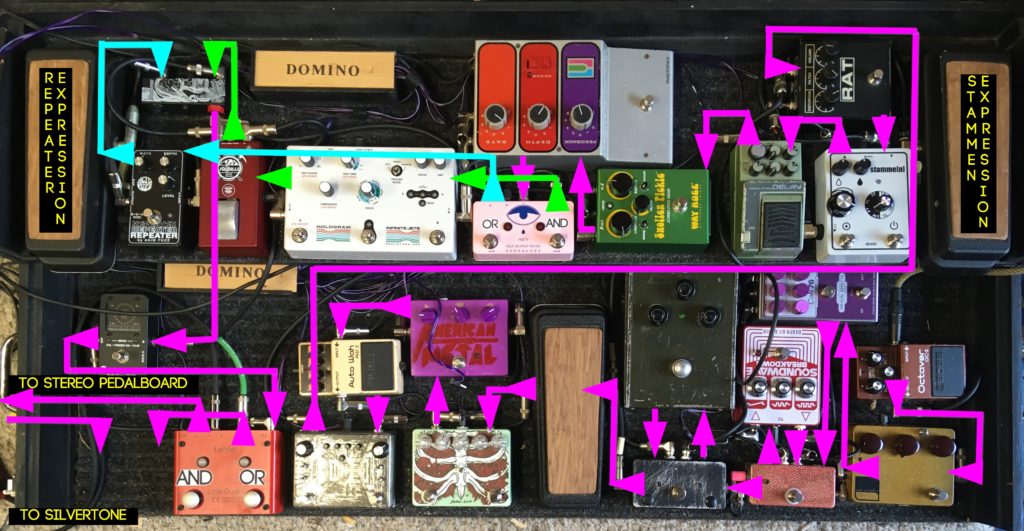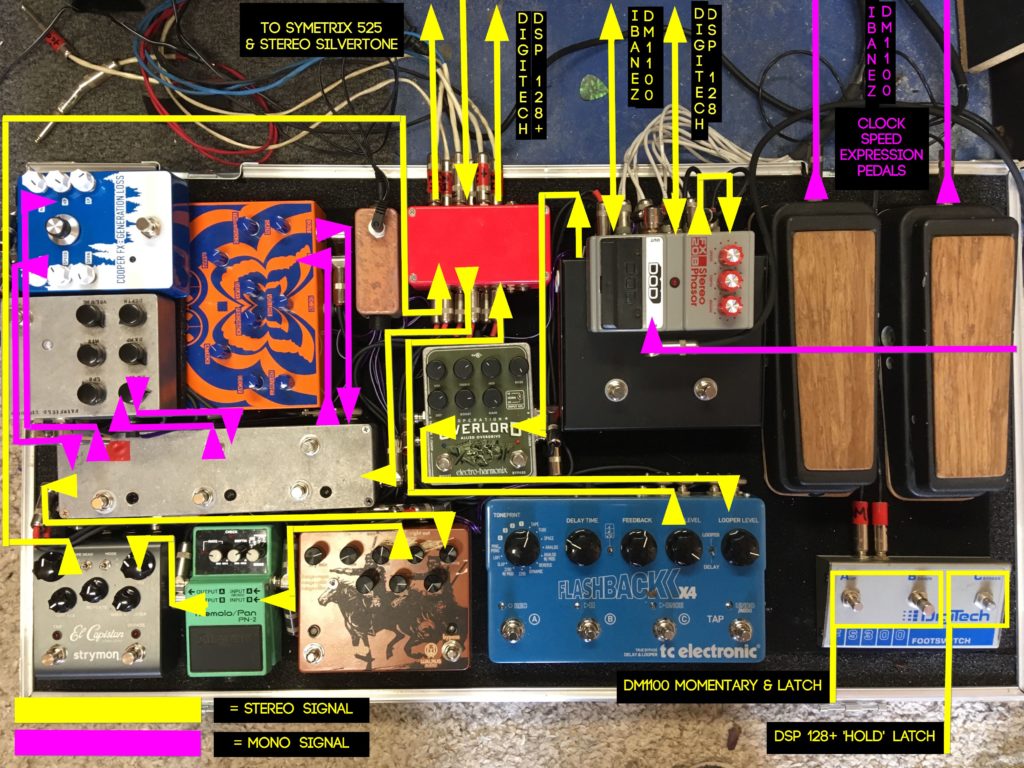
Part 1 of a 3 article series, discussing the influence of game audio on the creation of systems for the playback of sound, specifically in relation to playing guitar within the construct of an elaborate realtime effects system for guitar.
Does sound have the ability to slow down the turning of the earth? Not scientifically, but perceptually?
Somewhere tangled in the frequency-sheets of sound stands a lone guitar player; glaciers of distortion covering invisible mountains with blankets of white noise atop towering peaks. Impossible to reconcile the enveloping resonance from common six-stringed instrument; the full-on maelstrom of sound barely representing the visible playback mechanism slung over-shoulder. Expectations submerged in an enveloping cloud of cacophony, dipped in a modulated acid-bath of signal processing and reverberation, sound emerging as a rippling pool of cascading waves lapping on the shore of consciousness.
How do you dilate the universal frequency into a languid drift across moments in time? Notes on a scale transferred from fingertip to fretboard, magnetic pickups transferring vibrations to electricity. The weaving of a sonic tapestry, dyed with the circuits of a thousand components in a signal chain enshrouding the interaction in pure-potential. The perilous journey of intention from synapse-firing inspiration to eventual expression, communication, and connection. Simply-put: the energy-driving creation of the human spirit and the output thereof reaching the heart of someone.
The connection between guitar effects pedal signal flow, real time signal processing, and the dynamic nature of game audio has never been clearer to me. It feels like a million years ago that I married my love of noise-making with video games and the two continue to feedback (figuratively and literally) into each other as part of a self-perpetuating drone of influence. I’ve said in the past that it was a lack of limbs to turn knobs while playing guitar that drove me to leverage game engines to do the job for me. That, in conjunction with runtime DSP, accessible authoring environments, and a host of other features available in an audio engine, turned into my professional career and is a large part of my continued creative expression.

Looking at the current iteration of my pedalboard and amplifiers, 5 continuous controllers (expression pedals) serving as real time parameter controls (RTPCs), multiple signal-routing options, a cast of over 30 processing devices, and 5 amplifiers running in stereo/ mono configurations, I see the complexity of game audio systems fully realized with hardware. In the same light as a game audio tool like Audiokinetic’s Wwise, the dynamic control and modification of the realtime playback of audio is at the heart of how I choose to express myself both in games and out. I shouldn’t be surprised by the elaborate system that I’ve realized as part of my personal expression, it makes total sense to me.

In comparison to music (or the loosest definition of it): What does a game express? My goal of self expression, or unlocking the sounds within me, feels in some ways similar to the way a game is an expression of mechanisms, by will of the player. I am a guitar player in the same way that someone is a game player. A person who interacts with a control mechanism (instrument/ controller) through the design constraints or range of options available within a system (music/gameplay). I’m not the first one to draw parallels between games and instruments. I find pedal effects, rack mount processing, and the dynamic control of properties in the same way some game developers see shaders, physics, emergent gameplay, or controller input; the ability to express some vision of a reality translated to participatory experience.
The improvisation of a player (while playing) creates a dynamic expression of the system within the constraints of what’s been designed. The emergent play that comes from breaking or exploiting systems (as seen in speed runs) runs parallel to the ideas of mastery and magic. Mastery: because a players awareness of a systems limits can breed a kind of creativity. Magic: because the limits cannot be truly known until happened-upon either by chance or through deep exploration. This analogy mirrors my creative process, in that I find mastery and magic is at the heart of exploring ones craft; whether guitar, gaming, or in the practice of any art.
Fueled by my passion for creating systems ranging from simple to complex in service of sound and games, I’ve found that the spirit of this passion mirrored in the development of the possibility space afforded by guitar, effects, and amplification. The results of this can be heard on the self-released album Lost Landscapes under the Lost Chocolate Lab moniker. Read-on for the true account of a mind in full embrace of leveraging the dynamics available during spontaneous composition towards bending the fabric of space and time.
Part 2 – Lost Landscapes | Pedalboards & Processing
Part 3 – The Evolving Playback Mechanism (Released 9/12/18)
Lost Chocolate Lab plays Lost Landscapes in Seattle at The Chapel on September 14th 2018 at 8pm